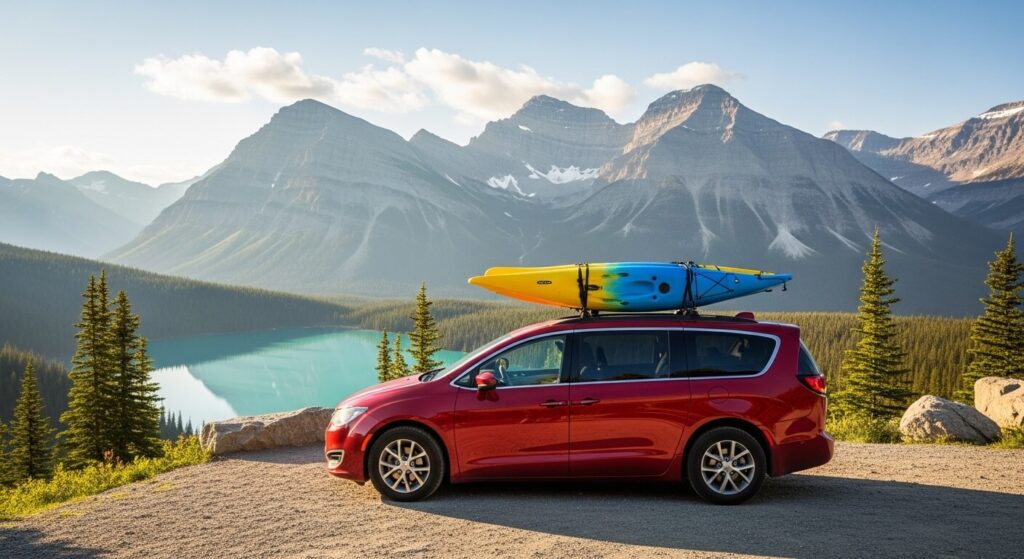Sometimes picking the right kayak rack for Chrysler Voyager feels like trying to stuff a square peg in a round hole—you want something steady, safe, and doesn’t rattle like loose change every time you hit a bump. You already know the Voyager isn’t just a family van, it doubles as your weekend adventure buddy, so the rack has to handle weight, wind, and weird parking-lot angles without making you nervous. After going through specs, feedback, and way too many half-useful comparisons, one rack actually stood out for its sturdiness and how simple it is to mount: the IKURAM Kayak Roof Carrier Rack. If you want a rack that holds your kayak like it actually respects it, that’s the one worth trusting.
Best 5 Kayak Racks for Chrysler Voyager
01. IKURAM Kayak Roof Carrier Rack
The IKURAM Kayak Roof Carrier Rack is built for paddlers who want a sturdy way to haul their kayak, canoe, or even surfboard on their vehicle. Designed with a wide J-style profile, it fits most crossbars including square, aero, and round bars, making it a versatile option for road trips. Its steel tube frame with thick padding reduces scratches on your kayak while keeping it snug during travel. If you haul gear for weekend kayaking or paddleboarding, this rack gives dependable support without taking too much roof space.
Pros:
- ✅ Heavy-duty steel frame for better durability
- ✅ Fits multiple crossbar types (round, square, aero)
- ✅ Foam padding to protect kayak or canoe surface
- ✅ Multi-purpose use for kayak, canoe, or surfboard
Cons:
- ❌ Can be bulky if you need to store it frequently
- ❌ Straps included may not feel as heavy-duty as aftermarket tie-downs
02. FORWODE Premium Kayak Roof Rack
The FORWODE Premium Kayak Roof Rack is built for car owners who need a solid and practical way to carry kayaks, canoes, or paddleboards without hassle. Made from heavy-duty steel with thick padding, it gives your kayak the right support and reduces scratches while loading and unloading. It fits a wide range of vehicles including SUVs, sedans, and trucks with crossbars, making it a good fit for people who want a single rack to use across different cars. Outdoor enthusiasts who carry gear for fishing kayaks, sea kayaks, or touring kayaks will find this rack particularly useful.
Pros and cons of the FORWODE kayak roof rack can be seen below:
Pros:
- ✅ Strong steel frame with anti-rust coating for long-term use
- ✅ Foam padding protects hulls of kayaks, canoes, and SUP boards
- ✅ Easy installation on most crossbars and roof racks
- ✅ Suitable for multiple watercraft types like fishing kayaks, paddleboards, and small boats
Cons:
- ❌ Straps may need upgrading for heavier kayaks
- ❌ Not ideal for vehicles without existing roof crossbars
- ❌ Folding mechanism could feel stiff at first
03. Malone Foldaway-5™ Multi-Rack
The Malone Foldaway-5™ Multi-Rack is built for kayakers and paddleboard fans who want a rack that can fold down when not in use but still carry heavy gear when needed. Its design works with most crossbars, and it’s capable of holding kayaks, SUPs, or even canoes without needing too many extra parts. The folding system makes it easier to park in garages or low-clearance spots, which is a headache with fixed J-cradles.
Pros:
- ✅ Works with kayaks, canoes, and SUP boards (multi-purpose use)
- ✅ Folding design helps with garage storage and clearance
- ✅ Sturdy steel build with corrosion-resistant coating
- ✅ Includes universal mounting hardware
Cons:
- ❌ Bulkier compared to single-purpose racks
- ❌ Foam padding may wear out after extended heavy use
- ❌ Takes more time to strap multiple boats securely
04. Taelakeni 2 Pairs Kayak Carrier Racks
The Taelakeni 2 Pairs Kayak Carrier Racks are built for outdoor enthusiasts who need a solid and reliable way to transport their kayaks. Designed to fit most crossbars including round, square, and flat styles, these roof rack kayak carriers help keep your gear secure whether you’re heading to the lake, river, or coast. With heavy-duty steel construction and foam padding, they add stability and reduce scratches on both the kayak and your vehicle roof. Perfect for SUV, truck, or car roof rack systems, this kit is aimed at paddlers who want to carry multiple kayaks without much hassle.
Pros:
- ✅ Fits most crossbar types (round, square, flat, and oval)
- ✅ Foam padding protects kayaks from scratches and dents
- ✅ Sturdy steel build for long-lasting use
- ✅ Can carry up to 2 kayaks, making it ideal for families or groups
Cons:
- ❌ Installation may take some time for beginners
- ❌ Not foldable, so it can add height when not in use
- ❌ Straps could be improved for extra heavy kayaks
05. Yakima JayLow Kayak J Cradle
The Yakima JayLow Kayak J Cradle is built for paddlers who need a sturdy rooftop solution without the headache of complicated installs. This rack can hold one kayak in the J-cradle position or two kayaks when used in the stacker setup, giving flexibility for solo trips or outings with a partner. Its universal fit works with most crossbars, making it a reliable choice for SUVs, trucks, or sedans looking to carry gear. The built-in cam lever also makes adjusting angles quick, so you’re not wasting time fiddling with hardware before hitting the water.
Pros:
- ✅ Fits one kayak in J-cradle mode or two in stacker position
- ✅ Compatible with most factory and aftermarket crossbars
- ✅ Includes heavy-duty straps and bow/stern tie-downs for secure transport
- ✅ Simple fold-down design for easier garage clearance
Cons:
- ❌ Slightly bulky compared to low-profile carriers
- ❌ Padding could wear out faster with heavy, frequent use
- ❌ Not the lightest option for rooftop removal or storage
How to Choose the Best Kayak Racks for Chrysler Voyager
A minivan doesn’t scream “kayak hauler” the same way a pickup does, but let’s be real—Chrysler Voyager owners are practical folks. You’ve got kids, groceries, maybe a dog crate in the back, and yet you still want to sneak away to the water with a kayak or two strapped up top. So the question becomes messy: which rack actually works on a Voyager roof without turning the whole setup into some rattling metal disaster that whistles at highway speeds?
The roof itself is the first headache
Voyagers usually come with factory side rails on newer trims, but not always. Without those, you’re stuck buying a crossbar system first, which adds another $150–$300 to the cost before you even think about kayak cradles. Some Voyagers have lower roof weight ratings than SUVs too, around 150 pounds max load. That number matters because a single touring kayak can weigh 60–70 pounds, and if you’re carrying two plus racks, straps, maybe a paddle mount, you’re pushing that limit. Ignore it and you risk bending rails or worse, ripping the rack off mid-drive.
I once saw a guy on I-95 with a kayak bouncing like a loose tooth on top of a minivan, straps flapping like wild flags. Scary part? He had three kids in the back. Weight ratings aren’t just fine print—they’re survival notes.
J-cradles vs saddles vs stackers, the ongoing argument
J-cradles are the most popular for minivans. They tilt the kayak on its side, saving roof space and making it easier to strap two boats. Average cost runs $120–$250 per pair. Saddles, on the other hand, hold the kayak flat, hull down. They’re more stable but take up more room. Stackers? Those are for people hauling three or four smaller boats at once—great for whitewater folks but usually overkill for casual Voyager owners.
According to outdoor gear market reports, over 55% of recreational paddlers use J-style carriers, mainly because they balance cost and space efficiency. Saddles still dominate for sea kayaks though, since longer boats feel steadier lying flat.
Loading height, the detail most people regret later
The Chrysler Voyager sits lower than SUVs, which at first seems like a blessing. You don’t need a ladder just to hoist up your kayak. But the width of the roof still makes it awkward if you’re shorter than 5’6. Lift-assist systems like Thule Hullavator Pro drop the kayak down to waist level for loading. They’re amazing but also insane on price—$600–$700 each. If you’re only hauling a cheap 10-foot sit-on-top once a month, that kind of money feels absurd. But if you’ve got a heavy 16-foot sea kayak and back problems, suddenly it feels like a smart buy.
Straps, ropes, and the paranoia factor
Most accidents don’t happen because of racks failing—they happen because people strap badly. A decent set of cam straps costs $20–$30, and bow and stern tie-downs another $20. Yet folks skip them, trusting only two straps over the hull. Problem is, wind lift at 70 mph can rip a kayak up like a kite. AAA once reported that road debris, which includes loose cargo, causes over 25,000 crashes a year in the U.S. Kayaks count as cargo. Do the math.
Noise, fuel economy, and the hidden tax of racks
Minivan owners often forget that a roof rack changes aerodynamics. Studies by the Department of Energy showed roof-mounted cargo can cut fuel efficiency by up to 25% at highway speeds. Kayaks strapped up there? Expect 2–4 mpg loss depending on conditions. Racks also hum and whistle if you don’t use fairings or aerodynamic bars. It’s not a dealbreaker, but on long trips, the sound can drive you half-mad.
Brand names and why people swear by them
Curt, Malone, Yakima, Thule. These are the big four. Curt and Malone usually run cheaper, functional but not flashy. Yakima and Thule push premium pricing but with extras like padded cradles, quick-release mounts, better corrosion resistance. Consumer surveys often put Thule racks in the top spot for durability. But if you live near the coast with salty air, corrosion protection matters more than logos. Rusted bolts will ruin any rack in a season.
Final messy thought
Choosing the best kayak rack for a Chrysler Voyager isn’t one-size-fits-all. It’s weight limits, roof rails, how many boats, how tall you are, how much you want to spend, and how paranoid you get at highway speed. For most families, a solid pair of J-cradles with quality crossbars and real tie-downs hits the sweet spot. If money flows freer, load-assist arms make life easier. Just don’t cheap out on straps, and for the love of sanity, check your roof weight rating before you strap two 80-pound kayaks up there thinking “the van can handle it.” The van might, but the rack probably won’t.






